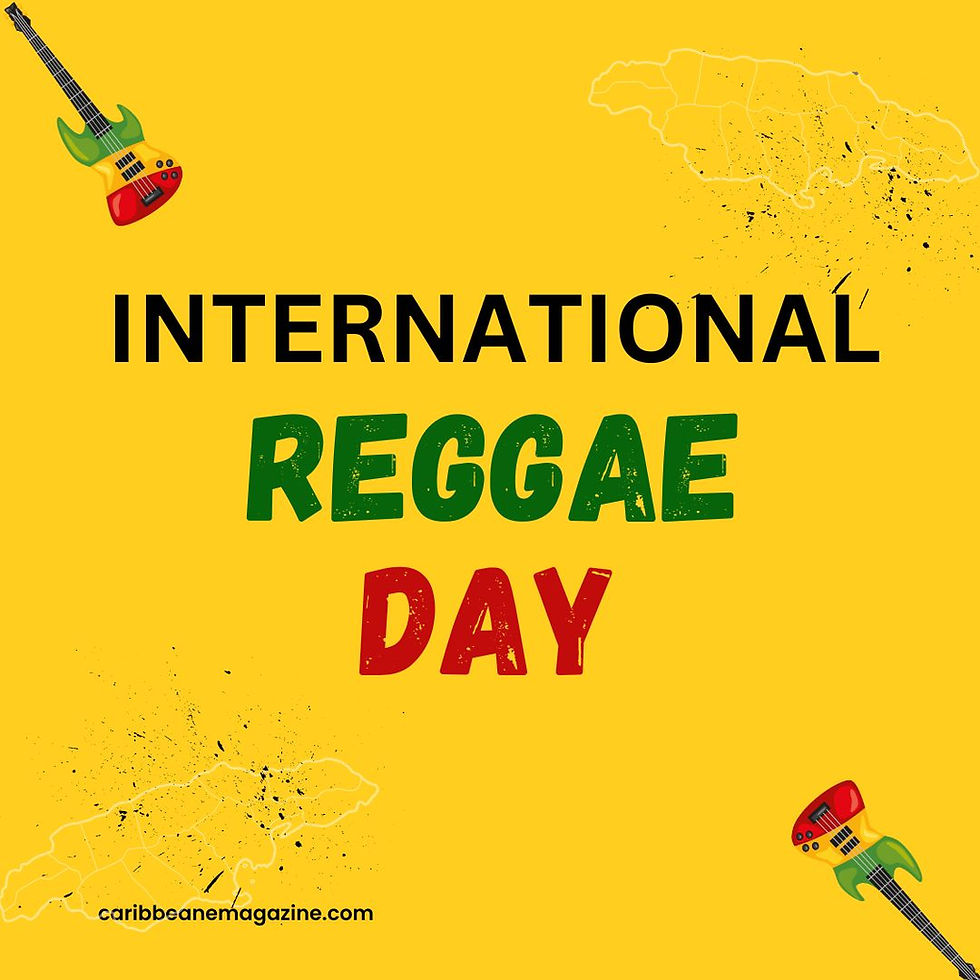International Reggae Day: Celebrating the Global Impact of a Jamaican Treasure
- Jul 1, 2024
- 4 min read

Every year on July 1st, the world comes together to celebrate International Reggae Day, a day dedicated to honoring the rich cultural heritage and global influence of reggae music. Born in the streets of Jamaica in the late 1960s, reggae has transcended its island origins to become a universal language of resistance, peace, and love. This genre, with its distinctive rhythm and profound messages, continues to inspire and unite people across the globe. Let's delve into the history, significance, and enduring legacy of reggae music.
The Roots of Reggae
Reggae music emerged in Jamaica, a melting pot of musical styles and cultural influences. Its roots can be traced back to earlier Jamaican genres such as ska and rocksteady. The genre's evolution was influenced by a myriad of factors, including African rhythms, Caribbean musical traditions, American jazz and blues, and Rastafarian spirituality.
Reggae is characterized by its offbeat rhythms, often referred to as the "one drop" beat, and its bass-heavy sound. The lyrics typically address social issues, political struggles, and themes of love and unity, reflecting the lived experiences and aspirations of the Jamaican people.
The Pioneers of Reggae
Several key figures have played pivotal roles in the development and popularization of reggae music:
Bob Marley: Undoubtedly the most iconic figure in reggae, Bob Marley's music and message of peace, love, and social justice resonated worldwide. Songs like "No Woman, No Cry," "One Love," and "Redemption Song" have become anthems of hope and resilience.
Peter Tosh: A founding member of The Wailers along with Marley, Tosh's solo career was marked by his militant stance on social issues and his advocacy for the legalization of marijuana. His powerful voice and uncompromising lyrics made him a formidable force in reggae.
Jimmy Cliff: Known for his role in the film "The Harder They Come," which introduced reggae to an international audience, Cliff's music blends reggae with elements of soul and rock. His hit songs "Many Rivers to Cross" and "You Can Get It If You Really Want" are timeless classics.
Burning Spear: Winston Rodney, better known as Burning Spear, is revered for his deep, soulful voice and his commitment to Rastafarian principles. His music, including songs like "Marcus Garvey" and "Slavery Days," serves as a powerful reminder of reggae's roots in African heritage and social consciousness.
Reggae's Global Influence
From its humble beginnings in Jamaica, reggae has spread to every corner of the globe, influencing a wide array of musical genres and cultures. Its impact can be seen in the rise of reggae bands and artists outside of Jamaica, such as UB40 from the UK, SOJA from the US, and Alpha Blondy from Côte d'Ivoire. Reggae's distinctive sound has also permeated pop, hip-hop, and electronic music, with artists like Rihanna, Snoop Dogg (who embraced a reggae persona as Snoop Lion), and Major Lazer incorporating reggae elements into their work.
Reggae festivals have sprung up around the world, attracting millions of fans and celebrating the genre's vibrant culture. Events like Reggae Sumfest in Jamaica, Rototom Sunsplash in Spain, and Reggae Geel in Belgium showcase the diversity and global appeal of reggae music.
The Cultural Significance of Reggae
Reggae is more than just music; it's a cultural movement that embodies the spirit of resistance and resilience. Its lyrics often tackle issues of oppression, inequality, and social justice, giving a voice to the marginalized and oppressed. The genre's association with the Rastafarian movement, which advocates for a return to African roots and a rejection of colonial and Western influences, further underscores its role as a vehicle for cultural and political expression.
Reggae's emphasis on unity, peace, and love has also made it a symbol of hope and solidarity. The genre's message transcends cultural and geographical boundaries, resonating with people from all walks of life.
Celebrating International Reggae Day
International Reggae Day, established in 1994 by Jamaican radio broadcaster Andrea Davis, is a global celebration of reggae music and its contributions to world culture. On this day, people around the world come together to honor the artists, the music, and the message of reggae. Celebrations often include live performances, DJ sets, panel discussions, and cultural exhibitions.
In recent years, the advent of digital media has expanded the reach of International Reggae Day, with virtual events and online broadcasts allowing fans from all over the world to participate in the festivities. Social media platforms are flooded with tributes to reggae legends, personal stories of how the music has impacted lives, and calls to action inspired by reggae's message of social justice.
Conclusion
International Reggae Day is a testament to the enduring legacy of reggae music. It is a day to celebrate the rich history and cultural significance of a genre that has given voice to the voiceless, fostered unity and peace, and inspired countless individuals worldwide. As we honor the pioneers and the music, let us also remember the message of reggae—a message of love, resistance, and hope that continues to resonate across generations and borders.
So, on July 1st, turn up the volume, let the rhythms move you, and join the global celebration of reggae music. One love!







Comments